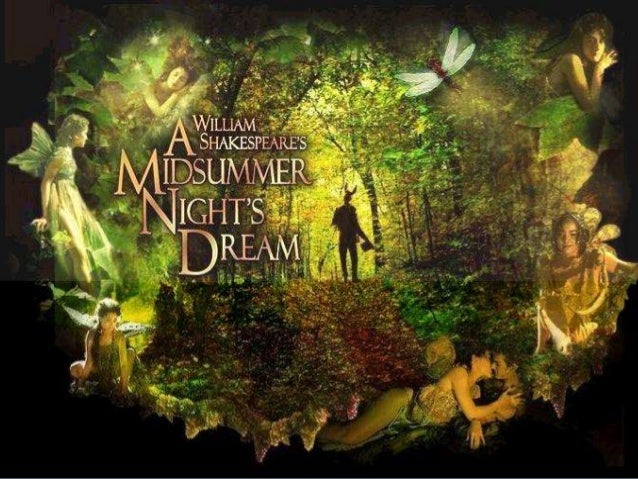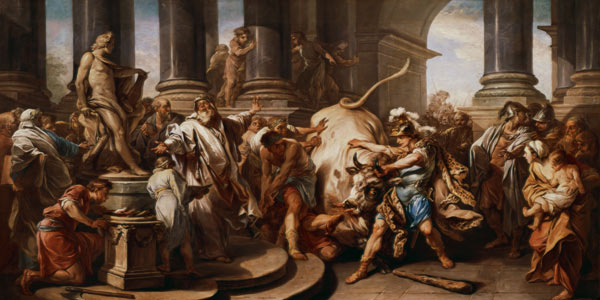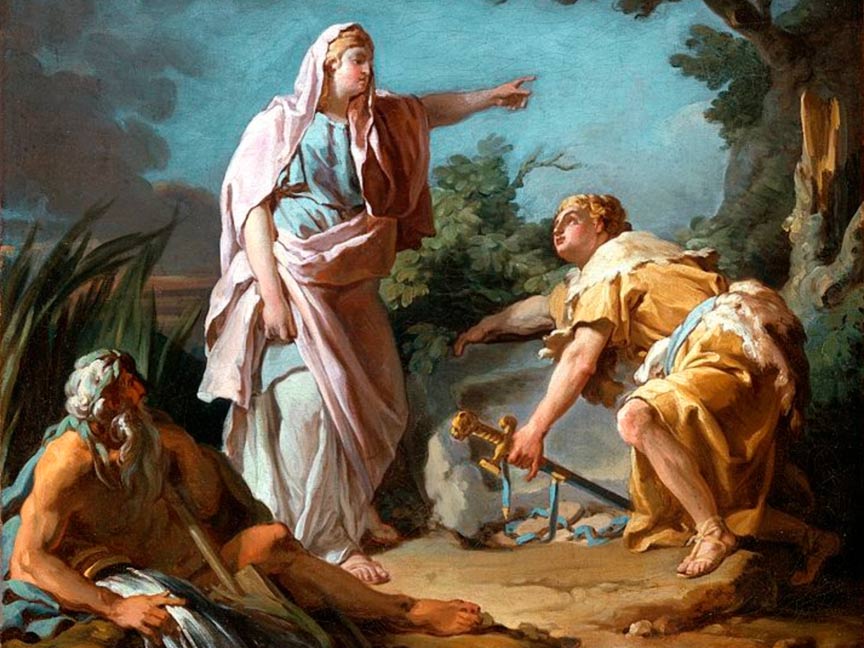William Shakespeare's "A Midsummer Night's Dream"

A Midsummer Night's Dream is a comedy written by William Shakespeare sometime between 1590 and 1597. It portrays the events surrounding the marriage of Theseus, the Duke of Athens, to Hippolyta. These include the adventures of four young Athenian lovers and a group of six amateur actors (the mechanicals) who are controlled and manipulated by the fairies who inhabit the forest in which most of the play is set. The play is one of Shakespeare's most popular works for the stage and is widely performed across the world.
From Wikipedia, the free encyclopedia
Video SparkNotes: Shakespeare's A Midsummer Night's Dream.
Aspidochelone.

According to the tradition of the Physiologus and medieval bestiaries, the aspidochelone is a fabled sea creature, variously described as a large whale or vast sea turtle, and a giant sea monster with huge spines on the ridge of its back. No matter what form it is, it is always described as being huge, often it is mistaken for an island and appears to be rocky, with crevices and valleys with trees and greenery and having sand dunes all over it. The name aspidochelone appears to be a compound word combining Greek aspis (which means either "asp" or "shield"), and chelone, the turtle. It rises to the surface from the depths of the sea, and entices unwitting sailors with its island appearance to make landfall on its huge shell and then the whale is able to pull hem under the ocean, ship and all the people, drowning them. It also emits a sweet smell that lures fish into its trap where it then devours them. In the moralistic allegory of the Physiologus and bestiary tradition, the aspidochelone represents Satan, who deceives those whom he seeks to devour.
From Wikipedia, the free encyclopedia
Theseus.

Theseus was the mythical king of Athens and was the son of Aethra by two fathers: Aegeus and Poseidon. Theseus was a founder- hero, like Perseus, Cadmus, or Heracles (Hercules), all of whom battled and overcome foes that were identified with an archaic religious and social order. As Heracles was the Dorian hero, Theseus was a founding hero, considered b Athenians as their own great reformer: his name comes from the same root as θεσμός ("thesmos"), Greek for "The Gathering". The myths surrounding Theseus - his journeys, exploits, and family - have provided material for fiction throughout the ages.
From Wikipedia, the free encyclopedia
Hercules.

Hercules is the Roman name for the Greek divine hero Heracles, who was the son of Zeus (Roman equivalent Jupiter) and the mortal Alcmene. In classical mythology, Hercules is famous for his strength and for his numerous far- ranging adventures. The Roman adapted the Greek hero's iconography and myths for their literature and art under the name Hercules. In later Western art and literature and in popular culture, Hercules is more commonly used than Heracles as the name of the hero. Hercules was a multifaceted figure with contradictory characteristics, which enabled later artists and writers to pick and choose how to represent him. This article provides an introduction to representations of Hercules in the later tradition.
From Wikipedia, the free encyclopedia
Labours of Hercules.
The twelve labours of Heracles or Hercules are a series of episodes concerning a penance carried out by Heracles, the greatest of the Greek heroes, whose name was later Romanised as Hercules. They were accomplished over 12 years at the service of King Eurystheus. The episodes were later connected by a continuous narrative. The establishment of a fixed cycle of twelve labours was attributed by the Greeks to an epic poem, now last, written by Peisander, dated about 600 BC. After Hercules killed his wife and children, he went to the oracle a Delphi. He prayed to the god Apollo for guidance. Hercules was told to serve the king of Mycenae, Eurystheus, for 12 years. During these 12 years, Hercules is sent to perform twelve difficult feats, called labours.
From Wikipedia, the free encyclopedia
Aegean Sea.

The Aegean Sea is an elongated embayment of the Mediterranean Sea located between the Greek and Anatolian peninsulas, i. e., between the mainlands of Greece and Turkey. In the north, it is connected to the Marmara Sea and Black Sea by the Dardanelles and Bosporus. The Aegean Islands are within the sea and some bound it on its southern periphery, including Crete and Rhodes. The sea was traditionally known as Archipelago, nut in English this word's meaning has changed to refer to the Aegean Islands and, generally, to any island group.
From Wikipedia, the free encyclopedia
Aegeus.

In Greek mythology, Aegeus was an archaic figure in the founding myth of Athens, The "goat-man" who gave his name to the Aegean Sea was, next to Poseidon, the father of Theseus, the founder of Athenian institutions and one of the kings of Athens.
From Wikipedia, the free encyclopedia
Tom Stoppard.
Sir Tom Stoppard OM CBE FRSL (born 3 July 1937) is a British playwright and screenwriter, knighted in 1997. He was written prolifically for TV, radio, film and stage, finding prominence with plays such as Arcadia, The Coast of Utopia, Every Good Boy Deserves Favour, Professional Foul, The Real Thing, and Rosencrantz and Guildenstern Are Dead. He co-wrote the screenplays for Brazil, The Russia House, and Shakespeare in Love , and has received one Academy Award and four Tony Awards. Themes of human rights, censorship and political freedom pervade his work along with exploration of linguistics and philosophy. Stoppard has been a key playwright of the National Theatre and is one of the most internationally performed dramatists of his generation.
From Wikipedia, the free encyclopedia
Oberon.
Oberon (also spelled Auberon) is a king of the fairies in medieval and Renaissance's literature. He is best known as a character in William Shakespeare's play A Midsummer Night's Dream, in which he is Consort to Titania, Queen of the Fairies. Oberon's status as king of the fairies comes from the character of Alberich , a sorcerer in the legendary history of the Merovingian dynasty. In the legend, he is the otherworldly "brother" of Merowech, whose name is the eponym of the Merovingians but whose actual existence is unproven. Alberich wins for his eldest son Walbert the hand of a princess of Constantinople. In the Nibelungenlied, a Burgundian poem written around the turn of the 13th century, Alberich guards the treasure of the Nibelungen ,but is overcome by Siegfried.
From Wikipedia, the free encyclopedia
Potion.
A potion (from Latin potio "drink") is a magical medicine, drug or poison in liquid form. In mythology and literature, a potion is usually made by a magician, dragon, fairy or witch and has magical properties. It is used for various motives including the healing, bewithcing or poisoning of people. For examples, love potion for those who wish to fall in love (or become deeply infatuated) with another (the love potion figures tragically into most versions of the tale of Tristan and Iseult, including Richard Wagner's opera Tristan und Isolde); sleeping potions to cause long term or eternal sleep (in folklore, this can range from the normal REM sleep to a deathlike coma); and elixirs heal/cure any wound/malady (as in C. S. Lewis' The Lion, the Witch, and the Wardrobe).
From Wikipedia, the free encyclopedia
Vocabulary.
1. Craftsmen's Play: 工匠們的遊戲

2. Syllogism: 三段論;推論

3. Preoccupation: 全神貫注,入神;關注的事物
4. Sacrament of Holy Matrimony: 婚姻圣事
5. Allusion: 暗示,提及
6. Demi- God:半神
7. Cupid Love Potion Flower: 丘比特愛情藥水花
沒有留言:
張貼留言